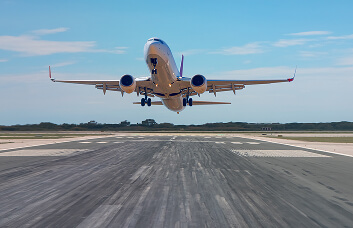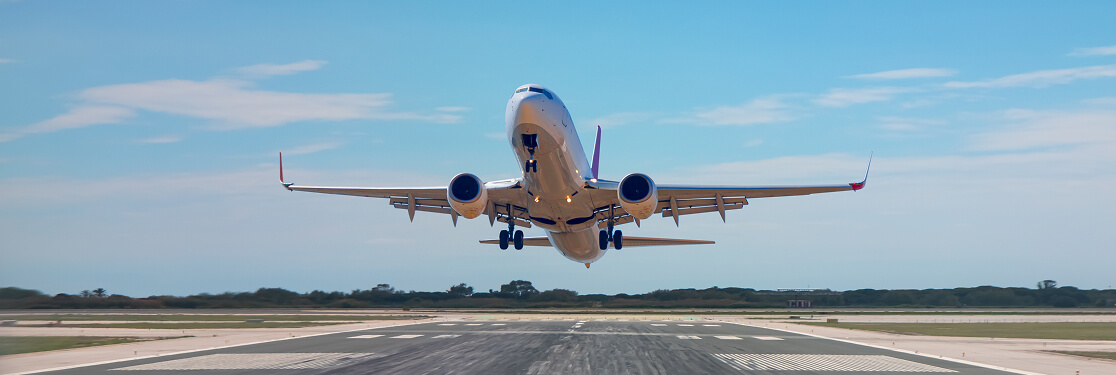The following plans are some of the most popular plans among our customers and provide strong coverage for the most common flight-related travel disruptions like flight cancellations, trip delays, missed connections, and mishandled luggage.
We analyzed 100+ flight travel insurance policies from the nation's top insurance companies. See a full list of the best flight insurance plans for 2026.
Flight insurance, or airline ticket insurance, provides financial protection for flight cancellations, significant unexpected delays, or baggage issues if you are traveling via a commercial airline. This coverage typically comes included as part of a comprehensive travel insurance policy.
You can buy flight insurance directly through major airlines, but third-party travel insurance providers offer more comprehensive plans, flexible options, and price points.
For example, most flight insurance coverage sold by third-party travel insurers doesn’t stop at covering just your flight, but also comes with medical coverage and full-trip protection for the entire cost of your trip if you run into issues. This can include offering reimbursement for hotels, rental cars, and more if your trip is cancelled due to a reason covered by the policy.
Here are a few main benefits of travel insurance for flights:
Start a quote to compare prices of flight insurance plans from the nation's top providers.
Yes, travel insurance is designed to cover flight cancellations for a number of different scenarios, including severe weather, airport closures, natural disasters, common carrier reasons, and more. Most plans also allow you to cancel your flight and get a reimbursement if you or a travel companion falls ill and can’t travel.
One important caveat is that standard flight insurance will not cover elective flight cancellations.
This means you cannot simply cancel your flight because you no longer want to travel. If this type of option is important to you, some policies offer an optional add-on called "Cancel For Any Reason" which allows you to cancel your flight on a whim and still receive a partial reimbursement for up to 75% of your entire trip cost, in most cases.
Unlike policies purchased directly through airlines, flight travel insurance plans from independent providers are designed to protect you for the entirety of your trip, beyond just your time in the sky.
Flight insurance coverage varies by provider, but most offer the coverage listed below.
Airlines are not required to pay out if your flight is delayed or cancelled due to reasons outside of their control, such as bad weather. This is where having travel insurance comes in.
Trip Cancellation coverage can reimburse up to 100% of your air travel expenses and other non-refundable trip costs if your trip is cancelled for a covered reason, such as a natural disaster, pilot strike, or inclement weather.
Depending on the scenario, airlines may offer you a partial refund, zero recompense, or even charge you hefty rebooking fees without this type of coverage.
Flight insurance can compensate you for significant delays that disrupt your travel plans. This coverage can reimburse unexpected costs related to food, overnight lodging, and rebooking fees if you get stranded due to unexpected flight delays.
Each policy has different stipulations for when coverage can take over, but significant delays typically range from 3 or more hours, depending on the policy.
When selecting a flight insurance plan, it pays to opt for policies with lower time restrictions for travel delay coverage.
If an unexpected travel delay results in you missing your connecting flight, many flight insurance policies will cover the cost to make new travel arrangements to catch up to your trip.
If you are forced to end your trip early due to an unforeseen event such as government-mandated airport closures or evacuation notices, Trip Interruption coverage can take over and cover the cost of the unused legs of your trip.
If you find yourself stranded while traveling due to a reason covered by your policy, this coverage can also help you rebook alternate travel arrangements and reimburse the cost of sending you home or helping you catch up to your initial itinerary.
Airlines mishandle millions of bags each year; therefore, most flight travel insurance plans include compensation and reimbursement for lost and stolen baggage as well as Baggage Delay coverage, ensuring you’re not stuck without your belongings.
These plans can not only reimburse you for the value of your luggage (up to the policy maximum), but they can also reimburse you for the cost of things like toiletries and replacement clothing while you wait for your delayed baggage to be located and delivered.
Many flight insurance plans also include some form of accidental death and dismemberment (AD&D) coverage. This is a form of travel life insurance that can offer financial compensation for AD&D caused by a common carrier.
As mentioned above, comprehensive travel insurance plans can go further than just offering flight protection and can cover you for unexpected medical emergencies while traveling. This can include reimbursing you for unexpected hospital stays, doctor visits, diagnostic tests, emergency surgeries, and prescription medication. This coverage is ideal for trips abroad where standard U.S. health insurance is not widely accepted.
Cancel for Any Reason and Interruption for Any Reason are rare benefits offered by select travel insurance policies that can extend your standard cancellation and interruption protection to include things that would otherwise be excluded. As the name suggests, these add-on benefits allow you to cancel or interrupt your trip for any reason at all and still receive a partial reimbursement. For example, if you are scared to leave for the airport because the roads are icy, this coverage could allow you to cancel and be reimbursed.


Common flight travel insurance exclusions include:
As coverage varies based on the individual plan you choose, it’s important to review the fine print to understand its exact limitations and policy exclusions.
Buying flight coverage from an airline is a good option if you are looking for flight-specific protection and aren’t concerned about it covering all aspects of your trip.
Many airlines partner with large travel insurance companies to offer basic trip protection to their customers. The drawback is that this coverage is often specific to your flight and is usually not intended to cover the entirety of your trip, such as hotels, rental cars, medical emergencies while you are away, and more.
The benefit of buying flight insurance through third-party providers is that you can often find wider-reaching coverage at a lower price. Third-party travel insurance plans are often customizable, which allows you to add valuable protections like Cancel for Any Reason coverage, which is not available through most airlines.
Here is a look at the benefits and tradeoffs with each:
The benefits of buying flight insurance from a third-party provider include:
Squaremouth can help you quickly and easily compare travel insurance plans from multiple providers at once. This is ideal for finding the best travel insurance coverage at affordable prices. Our plans also include ample options for customization through add-ons.
The benefits of buying flight insurance from an airline include:
Start a quote to see travel insurance plans and prices for your trip.
Comprehensive trip protection plans that include flight insurance cost around $31 per day on average.
The above figure is based on sales data from travelers who purchased flight insurance through Squaremouth in the past 12 months. Squaremouth visitors spend an average of $425 for comprehensive travel insurance with flight coverage, and have an average trip length of 14 days.
How much you will pay depends heavily on your specific trip parameters, such as trip cost, length, destination, age, and more.
It’s also important to note that this cost reflects more than just flight protection. Comprehensive plans typically include emergency medical coverage, trip cancellation and interruption reimbursement, baggage protection, and other benefits.
Many factors go into determining your exact flight insurance cost, including trip length, coverage limits, traveler age, and insured travel expenses. In general, expect to pay 4%-10% of your total trip cost for a policy with flight coverage.
For exact pricing, get a customized flight insurance quote and compare plans side-by-side.

Flight insurance is a reimbursement-based model that takes effect if your trip is derailed by unexpected flight cancellations, lengthy delays, medical emergencies, mishandled luggage, and more.
If you run into any issues before or during your trip, you can simply reach out to your travel insurance's 24/7 emergency assistance hotline for support. These agents are trained to help you find a solution, which can include rebooking you, helping you locate a suitable hospital, or helping you file a claim for reimbursement.
When filing a claim, you’ll be asked to provide supporting documentation, so it's important to keep detailed records of communications, receipts, and proof of your claims. The claims reimbursement process can take roughly 4-6 weeks, depending on the provider.

Finding the best flight insurance plan comes down to understanding your options and choosing coverage that fits your needs.
Here are our tips for finding the best flight insurance plan for your needs:
Websites like Squaremouth allow you to quickly compare travel insurance plans from top providers side by side. Our comparison tool can show you the price of each plan with detailed explanations of what's included. You can even filter for exactly the type of insurance benefit and limit you are looking for to quickly find a plan that meets your needs.
Many policies offered directly through airlines do not include coverage for medical emergencies or medical evacuations. If you’re planning international travel, we strongly suggest third-party policies that provide well-rounded protection for the entirety of your trip.
Since each policy and provider is different, we recommend reading the fine print to understand what’s excluded from the policy before you buy it. Refer back to our list of common exclusions above.
Many policies offer optional add-ons that can make your policy even more comprehensive. Some of the most popular add-ons commonly found in flight insurance plans include Cancel for Any Reason (CFAR) coverage and Rental Car Damage protection.


Flight insurance may not be necessary for everyone, but it can save you a lot of time and money if you run into travel disruptions or emergencies. The benefits offered by comprehensive coverage are well worth the cost, and you’ll likely be glad you bought it if you are ever forced to use it.
Flight insurance is likely worth buying if you meet any of the following scenarios:
Ultimately, whether flight insurance is worth it for you depends on your unique travel situation, the cost and complexity of your trip, and your personal risk tolerance. For some travelers, insurance might be a wise investment. For others, it could be an unnecessary added expense.
Squaremouth shares its tips and recommendations based on the most frequently asked questions from passengers.
Yes, you can purchase travel insurance anytime after booking your flight up until your departure date. With that said, it’s best to buy coverage as soon as possible.
The earlier you purchase, the more coverage options you’ll have. Buying travel insurance early also allows you to qualify for time-sensitive benefits like pre-existing condition waivers and Cancel for Any Reason (CFAR) coverage.
Trip insurance covers flight cancellations and delays that result from covered events, such as inclement weather or a mechanical breakdown. In the event your travel plans are impacted, your policy may cover the cost to book new travel arrangements.
Travel insurance does not cover voluntary changes to your plans, like wanting a new departure time or no longer wanting to travel. For the most cancellation flexibility, purchase a policy that includes CFAR & IFAR insurance. This benefit can provide partial reimbursement of your trip costs if you cancel for an uncovered reason.
Flight cancellation insurance can reimburse you for non-refundable travel expenses, including airline tickets, if you cancel your trip for a covered reason. Most plans cover cancellations relating to an unexpected illness, injury, family emergency, or severe weather events.
If your flight is disrupted and causes financial loss, you may be eligible for reimbursement through your travel insurance policy.
To request this reimbursement, you will need to file a travel insurance claim with your provider as soon as possible. The claims process typically involves the following steps:
Airline travel insurance is typically offered during the booking process and provides basic protection focused on flight-related issues, like cancellations or delays. It’s fast and convenient, but it usually comes from a single provider with limited customization.
Third-party flight travel insurance, on the other hand, gives you access to a broader selection of policies from multiple insurers. You can shop directly or use a comparison site like Squaremouth to get multiple flight insurance quotes and find a plan that better fits your trip.
Resources 10 min read
6 Best Flight Insurance Companies in 2026Travel Advice 8 min read
The Traveler’s Guide to Airline Travel InsuranceResources 10 min read
We analyzed 100+ policies and found the best flight insurance [...]
Read MoreTravel Advice 8 min read
Airline flights can be disrupted for bad weather, mechanical issues, and any number of other unforeseen events. When flights are delayed or even canceled, it can add unexpected costs to your trip, such as meal expenses and hotel charges. Airline travel insurance can reimburse you for those expenses and help keep your trip costs within […]
Read More